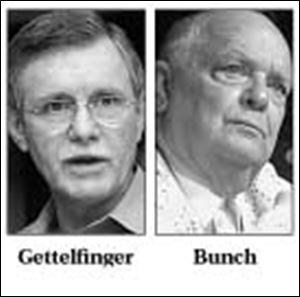
UAW retirees may soon see co-pays
10/21/2005
Thousands of retired auto workers in northwest Ohio could begin paying health insurance premiums for the first time if United Auto Workers members at General Motors Corp. vote to accept a precedent-setting deal with the struggling car-maker.
The plan, which was announced Monday detailed yesterday by union leaders in Detroit, would require GM retirees nationwide to begin paying insurance co-pays and premiums of $10 a month for individuals and $21 a month for families.
For now, the proposal, which would cap yearly expenses at $370 for individuals and $752 for families, applies only to GM retirees. But, if the deal is ratified by workers and wins needed court approval, competitors Ford Motor Co. and DamilerChrysler AG have said they will ask for similar concessions from their UAW workforces.
UAW President Ron Gettelfinger argued yesterday that the agreement is good for members and the company. "UAW-GM active workers and retirees have long enjoyed some of the best health care coverage of any industrial workers in America, and they will continue to do so under the terms of the agreement," he said.
The agreement affects active workers as well.
As part of the agreement, union members will be asked to defer $1 in future wage increases to subsidize the cost of retiree care. The money would come from quarterly cost-of-living increases hourly workers are to receive next year and a 3 percent wage increase due in September, 2006. Production workers now earn about $26 an hour.
Active workers would face other, unspecified increases in co-pays for prescription drugs, although their health coverage would remain unchanged, union officials said.
Hourly workers and most retirees would have to pay $5 more than they do now for a 90-day supply of mail-order prescriptions. They also would have to pay new, higher co-payments of up to $18 for erectile dysfunction medications such as Viagra.
If it is ratified, the agreement would save GM $3 billion annually before taxes and would cut $15 billion off its $60 billion in retiree health care liabilities.
The UAW said the deal protects low-income retirees who meet certain criteria, including company pension payments of $8,000 a year and less. Medical benefits will be unchanged for them.
UAW members at GM's Toledo Powertrain Plant were provided an outline of the changes in a bulletin from the plant's union leaders yesterday afternoon. The deal would affect 3,200 active workers there and an equal number of retirees.
Also impacted regionally would be retirees and nearly 2,200 hourly employees at a GM Powertrain factory in Defiance.
Oscar Bunch, president of UAW Local 14 at the Toledo facility, declined to comment until members were briefed on the plan.
Retirees interviewed were not pleased.
"We're dead wood," said 28-year machine repairman who retired from the plant in 2003. "We're costing them money." He spoke on the condition he wasn't identified.
Leroy Mays, who retired last year after 34 years with the nation's No. 1 automaker, was skeptical about the company's claimed financial problems and predicted that a majority of retirees would urge their former colleagues to vote against the proposal. However, retirees don't get to vote on this proposal or other contract matters.
Workers interviewed said they would wait to hear more about the proposal before making up their mind about how to vote.
Judy Carlisle, an hourly worker in Toledo, predicted her co-workers would give it serious consideration.
"We've been very fortunate with our benefit package over the years," she said. "We're all worried about the auto industry in general and the effects of oil price increases and imports on our market share."
But another hourly worker, who spoke on the condition he wasn't identified, expressed skepticism.
"Some people feel upper management put us in the position we're in now," he said. "They feel we shouldn't give up something we've bargained for. Either way, everybody's got to make personal sacrifices from the top on down to the bottom."
The Associated Press contributed to this story.
Contact Gary Pakulski at:
gpakulski@theblade.com
or 419-724-6082.